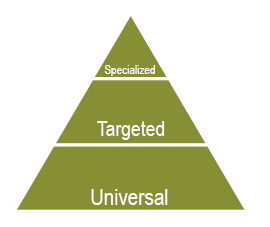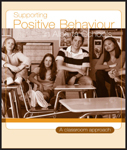 |
Universal Supports benefit all students
-
Talk with the students about the importance of asking questions and asking for help. Discuss how all questions are good questions and explain how asking a question may help other students who might have the same question.
- Develop classroom routines for asking for help, such as raising hands or going to the teacher's desk at a certain time.
- Teach student specific asking for help strategies, such as:
- Post visual reminders of strategies for asking for help. When appropriate, collaborate with students to develop these visual reminders.
- Use descriptive feedback to reinforce individual students when they demonstrate effective strategies for asking for help.
|
|
 |
Targeted Supports benefit students with more specific needs
-
Pair individual students with positive peers who can serve as role models in asking for help and can also provide support by responding to students' basic questions (e.g., "What do we do next? What supplies do I need? Where are they?"). Rotate these peers at regular intervals throughout the school year.
- Provide proximity by positioning yourself nearby individual students who may require assistance for certain tasks. This will make it easier for the student to ask for help.
- Work with individual students to identify personalized cues and prompts that they can use to signal that they need a teacher's help (e.g., putting a coloured cup on the corner of their desk).
- For students who over rely on adult assistance, encourage them to try on their own before asking for help. Strategies such as What to Do When Im Stuck or Ask Three, Then Me can be used by students to track their own progress in becoming more self-reliant.
|
Parents know their children well and can offer insights on how to support
their social and emotional well-being. There is strength in collaborating
on strategies that could be used at home, at school and in the community.
|
 |
Specialized Supports benefit the small number of students with sensory, physical, cognitive or behavioural needs that require intensive, individualized interventions
- In exceptional situations, individual students may need 1:1 adult support to facilitate communication so that other adults and students can understand and respond to requests for help from the student.
Parents know their children well and can offer insights on how to support their social and emotional well-being. There is strength in collaborating on strategies that could be used at home, at school and in the community.
|
|








